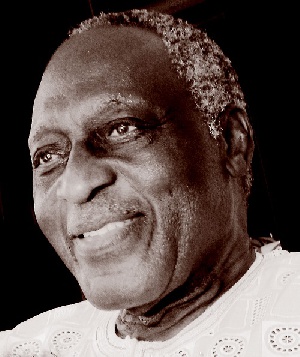Kofi Awoonor was attending a literary festival in Nairobi when he was killed in a siege at a Kenyan shopping centre. Ghanaian journalist Elizabeth Ohene looks back at the life of one of Ghana's most prominent men of letters:
He was born George Kofi Nyidevu Awoonor-Williams and somewhere along the line, the George and the Williams dropped off, the Nyidevu stayed when he was minded to sound formal, but for the past 40 years or so of his life, he was known as and called Kofi Awoonor.
Poet, writer, dramatist, actor, teacher, politician, diplomat and statesman, Professor Kofi Awoonor was born in Wheta on 13 March 1935.
He had a way with words that enabled him to get away with biting humour. He was erudite and witty; he loved books, films, plays and the theatre. He loved dances and music and rhythm, and as a young man was the soul and life of every party.
It used to be said of him that when he left the party, the music stopped. He was enchanted with the traditional dirges of his southern Ewe-speaking Anlo people and his first major writings were a translation from the original Ewe into English of the songs of the famous Anlo poet and lyricist Akpaloo.
Wole Soyinka appeal
After graduating from the University of Ghana he got a job with the newly established Institute of African Studies as a researcher, and moved into the heady circle of Ghana's first President Kwame Nkrumah and the pan-African campaigns of the early 1960s. When he was appointed to run the Ghana Film Corporation, he became a magnet for a lot of young and talented writers and film-makers, always with his feet firmly planted in the traditions of our ancestors but comfortable with modernity.
He spoke and wrote English beautifully in much the same way as he did many Ghanaian languages.
He founded the Ghana Playhouse and assumed responsibility for the development of theatre and drama in the country.
He did not only write and produce plays; he acted in them as well. One recalls his production of Wole Soyinka's The Lion and the Jewel at the Drama Studio in Accra at the time when Mr Soyinka was being held in custody in Nigeria.
Kofi Awoonor acted in the leading role and after the curtain, would come and make a passionate appeal to the audience to remember the plight of Wole Soyinka.
The George Awoonor Williams, gradually becoming Kofi Awoonor of the 1960s and 1970s, was an urbane and sophisticated Renaissance man who called and regarded as his friends people from every tribe and nationality around the world.
In 1975, after returning to Ghana after an absence of six years during which he got his masters and PhD degrees, he got dragged into one of the "subversion trials" that characterised the military regime of the 1970s.
More than eight of Ghana's top lawyers appeared for him at his trial and he spent almost a year in one of Ghana's disreputable prisons before he was set free.
His book, The House by the Sea, chronicles his time in jail.
UN anti-apartheid committee
When then-Flight Lieutenant Jerry Rawlings staged his coup d'etat of 31 December 1981, Kofi Awoonor joined the revolution with all his feet and hands, to borrow a Ghanaian phrase.
If the truth be told, Kofi Awoonor did not know how to do anything in a half-hearted manner.
In the heady days of the revolution he wrote a book, maybe a tract would be a better description, entitled The Ghana Revolution, in which he appeared to be arguing the case for Anlo hegemony, leading to this most cosmopolitan man being seen as an Ewe chauvinist.
General News of Tuesday, 24 September 2013
Source: BBC













